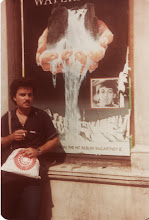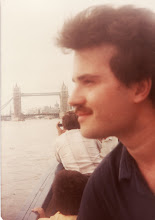 |
| Dulces, pero también rockeros / Sweet, but also rockers |
DULCES,
PERO TAMBIÉN ROQUEROS
En
estos tiempos tan faltos de listas de éxitos con mayúsculas, es bueno y
tonificante inmortalizar los directorios de los años 70. En una década en la
que un servidor escuchaba muy atentamente los éxitos del momento, es de lo más
lícito también enaltecer aquí a The Sweet, otro de los grupos que pugnó por los
primeros puestos de los hits parades (sobre todo los británicos y europeos) en
un claro intento de arrebatar el primer puesto a T. Rex o Slade, que fueron dos
de los más importantes grupos “rivales” con los que se encontró a la hora de
escalar las primeras posiciones. ‘Funny Funny’ (que había escuchado un par de
veces en la radio) fue el primer sencillo de este grupo que me compré. Recuerdo
que fue una tarde lluviosa, y desde que llegué a casa con el disco, su ritmo
encantador me acompañó esa noche y muchas más. Luego vendrían ‘Co-Co’, ‘Poppa
Joe’ (con ese atractivo ritmo latino), y sucesivamente, año tras año, todos los
que le siguieron. De hecho, ‘Love Is like Oxygen’, uno de sus últimos éxitos publicado
en 1978, me pilló mientras cumplía con
mi obligatorio –unas largas vacaciones, ya que me tocó destino en Las Palmas–
servicio militar. Ni que decir tiene que su todavía fresco sonido me hizo
recordar muchos de sus éxitos anteriores, y de cuando los bailaba en los
guateques con Ana, –entonces mi novia y desde 1979 mi esposa– en la lejana
península.
A
partir de 1971, sus atractivos rostros, sus largas y cuidadas melenas, y sus
sobresalientes voces pronto agenciaron a The Sweet un privilegiado puesto en el
incipiente vagón del Glam-Rock. Y aunque sus indumentarias fueron tan
estrafalarias como sus provocaciones: no dudaban en ‘darse el pico’ o aparecer
medio desnudos en fotos y filmaciones promocionales para llamar la atención, lo
que primaría sería una discografía excelente. Desde el mencionado ‘Funny Funny’
(los anteriores no entraron en listas), se reconoce la eficiente impronta del
dúo de compositores Nicky Chinn y Mike Chapman, que supieron trasladar sus
obras a un grupo que con sus voces e instrumentos llevaron a lo más alto temas
del calibre de ‘Co-Co’, ‘Poppa Joe’, ‘Alexander Graham Bell’, ‘Little Willy’,
‘Wig-Wan Bam’, ‘Block Buster!’, y ‘The Ballroom Blitz’, por citar solo algunos
de los triunfos dulces y sensacionales que ocuparon la cara estrella de sus
singles, la caras A, pero si algo distinguió a Brian Connolly (voz solista),
Andy Scott (guitarras, teclados y voces), Mick Tucker (batería y voces) y Steve
Priest (bajo y voces), fueron sus propias composiciones roqueras que ocuparon
las caras B de sus sencillos, y con las que consiguieron equipararse a potentes
grupos hard de la época con potentes guitarras, solos magistrales y unas voces
increíbles, lo que añadía un valor notable para el seguidor del grupo: por un
lado temas comerciales y bailables, y por el otro, arrebatadores cortes que
subían la adrenalina hasta cotas insospechables. Por el orden de los singles
detallados líneas más arriba, aquí van los temas escritos por The Sweet que
ocuparon las caras B, pero que muy bien podrían haber brillado como caras A:
‘You’re Wrong For Loving Me’, ‘Done Me Wrong All Right’, ‘Jeanie’ (este no es
un tema roquero, pero sus voces y un apasionante banjo country, lo convierten
en más que imprescindible), ‘Spotlight’, ‘Man From Mecca’, ‘New York
Connection’, ‘Need A Lot Of Lovin’, y ‘Rock & Roll Disgrace’.
Tras
siete años de éxitos, en 1979, mientras un servidor se licenciaba y volvía a su
Barcelona natal, Brian Connolly abandonaba The Sweet para iniciar una carrera
en solitario, pero ya nada volvería a ser igual. El 9 de febrero de 1997, y
después de años con vanos intentos por reverdecer viejos laureles, Connolly
fallecía de fallo hepático y doce infartos masivos. Sus años de bebida que
comenzó en la mejor época de The Sweet, y que prosiguió inhumanamente tras el
abandono del grupo, le acarrearon finalmente la muerte. Mick Tucker fallecería
en 2002 de leucemia. Actualmente siguen en activo dos versiones The Sweet con
miembros originales: ‘Andy Scott’s Sweet’, y Steve Priest’s Sweet’.
Hoy
no llueve como aquel lejano día en el que me agencié el single ‘Funny Funny’,
más bien hace un calor insoportable para ser el mes de mayo, pero en mi
tocadiscos no cesa de sonar ‘Ballroom Blitz’. Su arrebatador riff y galopante
batería, precedido de una introducción histórica: ¿Estás listo Steve? Uh-huh, ¿Andy?
Sí, ¿Mick? Ok, Muy bien muchachos, ¡allá vamos!, han convertido este tema en
uno de los más importantes hitos del Glam-Rock.
Texto
y caricatura: Juan Manuel Escrihuela
SWEET, BUT ALSO ROCKERS
In these times so lacking of charts of
hits in capital letters, is good and invigorating immortalize the directories of
the seventies. In a decade in which a server listened very carefully to the hits,
is also permissible here to exalt The Sweet, another group that struggled to
the top of the hits parades (especially British and European) in an apparent
attempt to snatch the top spot to T. Rex and Slade, who were two of the most
important “rivals” groups with which they found to climb the top positions.
'Funny Funny' (I had heard a couple of times on the radio) was the first single
from this group that I bought. I remember it was a rainy afternoon, and since I
came home with the disc, his charming rhythm pace with me with that night and
many more. Then came 'Co-Co', 'Poppa Joe' (with that sexy Latin rhythms), and
on, year after year, all that followed. In fact, 'Love Is Like Oxygen', one of
his latest hits published in 1978, caught me while doing my -some mandatory
long holiday, with my destination in Las Palmas- military service. Needless to
say his still fresh sound reminded me of many of his earlier successes, and
when I danced at parties with Ana, -then my girlfriend and my wife since 1979- in
the remote peninsula.
Since 1971, their attractive faces, their
long and very well maintained hairs, and outstanding voices soon they got to
The Sweet a privileged position in the emerging car of Glam-Rock. And although
their costumes were so bizarre as their provocations did not hesitate to kissing
each other or appear half naked in photos and promotional films for attention, but
the most important was his excellent discography. Since the mentioned 'Funny
Funny' (earlier singles not entered in the charts), the efficient imprint of
songwriting duo Nicky Chinn and Mike Chapman, who were able to move their works
to a group that with their voices and instruments carried to the top themes of
the caliber of 'Co-Co', 'Poppa Joe', 'Alexander Graham Bell', 'Little Willy',
'Wig-Wan Bam', 'Block Buster!', and 'The Ballroom Blitz', to name a few sweets
and sensational victories that occupied the star face of his singles, the A sides.
But if something distinguished Brian Connolly (lead vocals), Andy Scott
(guitars, keyboards and vocals), Mick Tucker (drums and vocals) and Steve
Priest (bass and vocals), were his own rockers compositions who occupied the
other sides of the singles, the B sides, and with that got equated to powerful hard
groups of the time with powerful guitars, masterly solos and amazing voices,
which added a value remarkable for the follower of the group: commercial and
danceable tracks in one side, and on the other, sweeping cuts that adrenaline
rose to unsuspected heights. By the order of the singles lines detailed above,
here are the songs written by The Sweet who occupied the B sides, that very
well could have shown like A sides: 'You're Wrong For Loving Me', 'Done Me
Wrong All Right', ‘Jeanie '(this is not a rocker theme, but their voices and
exciting banjo country, make it more than necessary), 'Spotlight', 'Man From
Mecca’, 'New York Connection', 'Need A Lot Of Lovin' and 'Rock & Roll
Disgrace’.
After seven successful years, in
1979, while a server got a degree and returned to his native Barcelona, Brian
Connolly left The Sweet to start a solo career, but nothing would ever be the
same. On February 9, 1997, and after years with vain attempts to rejuvenate old
laurels, Connolly died of liver failure and twelve massive strokes. His years
of drinking that began in the best time of The Sweet, and inhumanely continued
after the abandonment of the group, he finally hauled death. Mick Tucker also
dead in 2002 from leukemia. Currently still active two The Sweet versions with
original members: 'Andy Scott's Sweet' and ‘Steve Priest's Sweet '.
Today it does not rain like that
distant day when I buy the single 'Funny Funny', is a hot day for May, and my
turntable does not stop playing 'Ballroom Blitz'. His sweeping riff and
galloping drums, preceded by a historical introduction: Steve Are you ready?
Uh-huh, Andy? Yeah, Mick? Okay, Alright, fellas, let’s go!!, have made this tune
one of the most important milestones of Glam-Rock.
Text and caricature: Juan Manuel
Escrihuela




